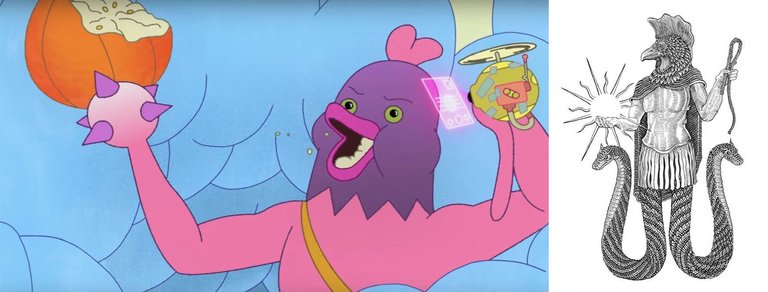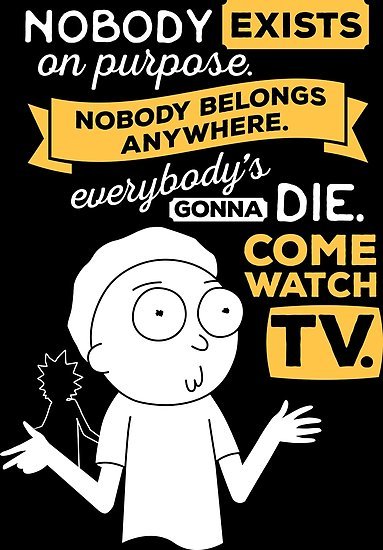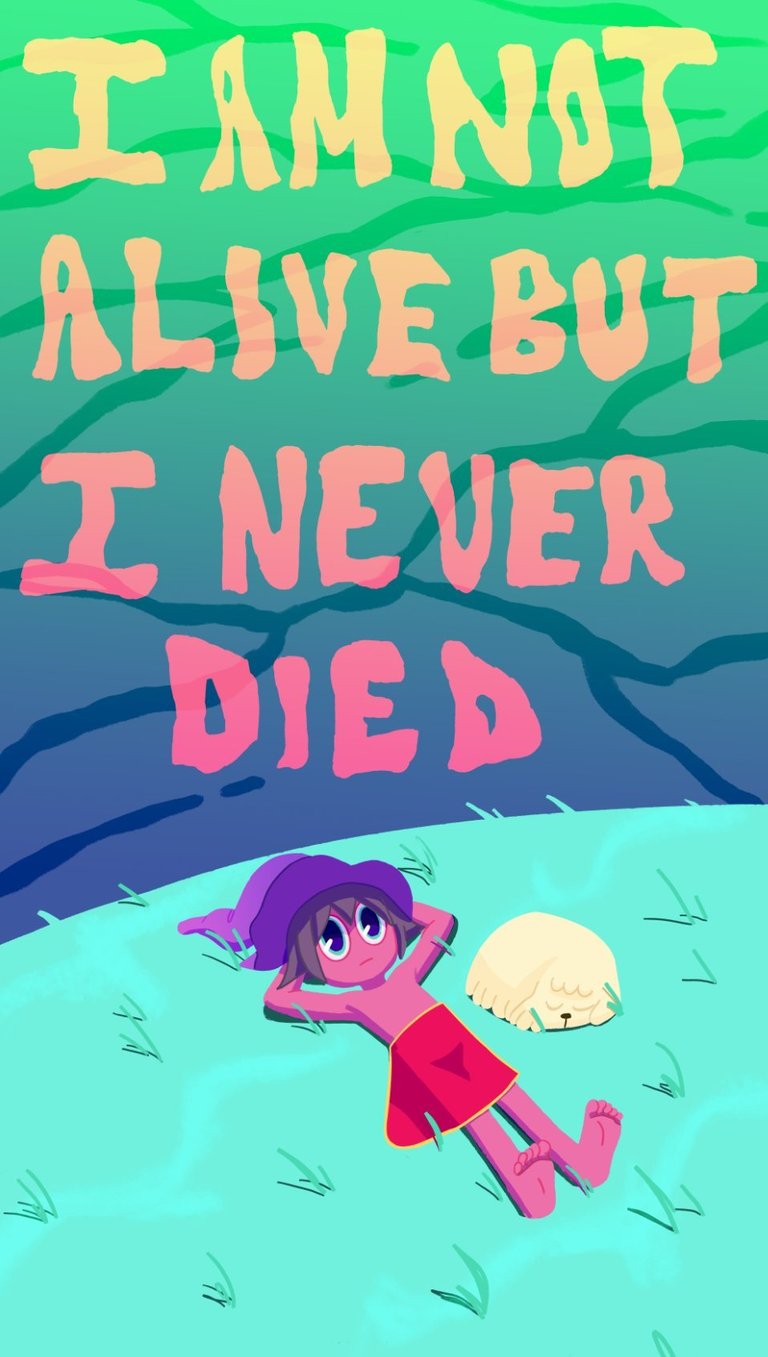The Midnight Gospel: the counterpart/optimistic version of Rick and Morty, or positive nihilism vs. negative nihilism
The Midnight Gospel is the new Netflix animated series that everyone is talking about. A show that dares to touch on topics such as death, transcendence, emotional maturity, or social inequity (topics that I am really passionate about) while coming up with ideas and emotions with such complexity through a therapeutic, psychedelic journey. The series, which I would say, we didn't even know we needed.

An American adult animated web television series
Between Rick and Morty and The Midnight Gospel there are similarities and differences, such as the style of animation and the way they deal with deep and philosophical subjects, respectively; but, as David Opie says, Rick and Morty might embrace nihilism more than most, thriving in the chaos of Rick's anarchic worldview, but the world ends over and over again for real in The Midnight Gospel, providing a cosmic counterpoint to the introspective teachings of the 'space-cast'.
This series is the animated adaptation of the Duncan Trussell podcast titled "The Duncan Trussell Family Hour", in which he navigates the psyche of very original guests, and perhaps for many, somewhat extravagant and/or eccentric: tramps, sorcerers, psychics, ex-convicts, philosophers, masters of meditation, psychotherapy experts, and writers. This is a true visual podcast - an animated podcast. In the series, Duncan stars in a “space-caster” (podcaster in the space) called Clancy, who visits simulated universes about to break into an apocalypse, using a multiverse simulator in a vagina-shaped bio-computer, in order to visit its extra-dimensional residents and interview them, thus managing to record the space-cast.
The person in charge of animating the series is the Adventure Time creator Pendleton Ward, who accomplishes this task using colorful, stimulating and creativity-overflowing environments, with characters that take strange and psychedelic forms. Animation works well as a complementary background for the stories, since it intentionally complements the interviews’ dialogues using complex references and metaphors: spiritual and full of esotericism (which, in my opinion, was exceptionally planned and executed) such as, for example, The Clancy's third eye: every time he "dies", or in other words, decides to leave the universe he is visiting (and it is important to mention, always ends up being destroyed by an apocalypse) in order to return to his reality after the interview is over, his third eye opens or activates; We also have the one from the second episode, where the avatar that Clancy uses to visit this universe is very similar to the Egyptian god and worshiped by the Gnostics: Abraxas, a deity who represented good and evil, who has been considered both an Egyptian god and a demon; Or also the ton of references presented to us in the fifth episode: the balance from The Egyptian Weighing of the Heart, Samsara or Dante's Nine Circles of Hell. Ultimately, the ones that I enjoyed the most, belonging to episode seven: The Sephirotic Tree (or Tree of life) that originates from Kabbalistic texts, and the fact that throughout the episode some of the arcana of the Tarot appear, in a very subtle way. Stunning references without a doubt.

Clancy's avatar and Abraxas
"Its origin is not well known and there are many opinions about it, but Carl Jung wrote a small gnostic treatise in 1916 called The Seven Sermons to the Dead, in which he called Abraxas the supreme power transcending both God and the Devil and uniting all opposites into one entity.”
In fact, the contrast between the colorful and provocative aspect of the animation and the podcast teachings is a lot to digest, since all the visual “fever dream” collides head-on with the themes covered by the show. You can even feel that the visual is totally disconnected from the audio. Sometimes we can focus more on the audio than on the pile of meaningful, visual references and metaphors that constantly bombard us through explosions of creativity, or sometimes the other way around; It can be difficult to focus on both at once, and easy enough to lose yourself in just one; Still, the layers Pendleton Ward adds to the overall story Trussell is telling, connect directly or indirectly to the show's lofty themes. In Rick and Morty this does not happen, despite also being full of references and significant metaphors, because there is an obvious correlation between what we see and what we hear.
Throughout the eight episodes of this first season, the series deals with different themes that are explored through the interviews. Clancy interviews a number of writers and specialists on spirituality and wellness, real-world personalities housed in all kinds of creatures. These people talk about topics such as magic, meditation, forgiveness, spiritualism, funerary rituals, death positivity, drug use, pain, moksha (transcendence) and existentialism; And although Rick and Morty does not cover each of these topics, it does cover at least that of existentialism (more than anything), and it is here where we can see that there is a great difference between both shows: the perspective and the way in which they address these concepts.
Rick and Morty presents several nihilistic ideas, starting with Rick, the protagonist. A highly nihilistic and existentialist character, which is why he becomes quite negligent, self-destructive, alcoholic, and even depressive. He even tries to kill God metaphorically multiple times; And, arguably, he never claims to believe in something. This attitude or posture towards life corresponds to one of the two opposite attitudes towards the acceptance of the lack of meaning of existence: negative nihilism.
According to Wikipedia, nihilism comes from the Latin nihil which means "nothing" and defines it as "the rejection of all religious and moral principles, often based on the belief that life is meaningless", and states that "nihilism denies what is claimed by a superior, objective or deterministic sense of existence, since these elements have no verifiable explanation. Instead, it is favorable to the prospect of a constant or concentric becoming of objective history, without any superior or linear purpose. It is in favor of vitalistic and playful ideas, of getting rid of all preconceived ideas to make way for a life with open options for realization - an existence that does not revolve around non-existent things.”
Many people think that nihilism means "believing nothing", pessimism or even terrorism, since over time these meanings have been given to the word, when in reality it is not so; Nihilism could be said to be, in a simple phrase, believing in nothing rather than believing nothing. However, there are authors who proposed that in nihilism there were two opposite attitudes towards the acceptance of the lack of meaning of existence: active and passive nihilism.
"Active nihilism, also called positive, is one that proposes the destruction of all traditional values that gave meaning to existence, mainly belief in God, to replace them with others that inaugurate a new moment in history, for the appearance of a new morality and a new man.
Passive or negative nihilism, on the contrary, is one that arises as a consequence of the death of God and the crisis of meaning that it generates. In this sense, passive nihilism manifests itself with attitudes such as hopelessness, inaction and the renunciation of the desire to live, because life, which until then had a supernatural entity, external to it, which endowed it with meaning, is then unsustainable, empty and meaningless.”

Poster by Carl Huber
In this sense, it could be said then that Rick is a negative nihilist, and I think that this is something clearly evident if the series has been seen. A negative nihilist is a negative one because after searching for the meaning of life and not finding it, he becomes desperate and is unable to give meaning to his life himself from this premise. In this series, the main topics dealt with are Sartre's existentialism, Lovecraft's cosmic horror and above all Nietzsche’s nihilism. Tha latter being the philosopher who would give the term a formal articulation within the scope of philosophical thought and who structured its conceptualization; but it happens that Nietzsche's nihilism has been attributed negative notions (as I have already mentioned above) which are unfortunately the most popular within the term (and perhaps here lies the importance of a distinction between negative and positive nihilism) due perhaps to a misinterpretation of his work, when in fact Nietzsche was trying to teach us to love life, in the way that the Stoics did. This has a certain similarity with the Buddhist perspective of life (which is related to several of the themes that The Midnight Gospel touches on).
The Midnight Gospel, on the contrary, approaches many of its themes (if not all) from a positive point of view and within nihilism, here we see how it is not about the destination but the journey: Trussell argues that the point of life is to search for meaning, no matter if we find it or not, and that's why Clancy is so determined to explore the multiverse with such bold intent. Isn't this what positive nihilism is all about? A positive and beneficial way to approach all the negative things in our life, and the opportunity to evolve and recover from tragedies and difficulties through resilience and acceptance; these are some of the things that true nihilism (positive nihilism) teaches us.
In the third episode of the series called, "Hunters Without a Home", Clancy visits the "Ass Cream" planet, which is actually a world that has been completely flooded. Here, he meets a fish man named Darryl, who has an entire crew composed of cats. The guest on which Darryl's character was based is ex-convict Damien Echols, who was sentenced to prison for the death of three children in Arkansas (the West Memphis Three case), and dealt with the confinement thanks to magic. In this episode, Darryl explains how his stint in prison helped him redefine the term "magic" to meaning anything that someone can achieve on a spiritual level such as Buddhism. He notes that western magical paths, such like that espoused by Aleister Crowley, are intended to achieve enlightenment in one lifetime. He further explains how meditation is key to achieving magic and how the Bible "when read correctly" can be understood as magic.
In the second episode, we also have Clancy interviewing a pair of deer dogs named Annie (Anne Lamott, an American writer) and Raghu (Raghu Markus) as they are shipped to a slaughterhouse where they are converted into sentient meat-mush creatures. They discuss the concepts of death and accepting it, with Annie reminiscing about people she was close with, who had no choice but to accept death due to having cancer. With Raghu they discuss Christianity and Jesus when he faced death.
Later on, in the last episode, Clancy (Duncan) interviews his own mother (Deneen Fendig), where they unpack how death brings meaning to life. In this episode, Clancy reveals that Deneen has stage four breast cancer and she explains how she and Clancy must deal with it; by crying. They discuss how most people avoid the subject of death with other things and that is why death becomes such a harsh subject for everyone. Eventually, Clancy accepts Deneen's death. This is an episode that, in my opinion, is the most emotional and powerful of the entire season.

Fanart by Tallouri
So, The Midnight Gospel not only tells us about deep and philosophical issues in an informative way, but also invites us to reflect on them; it teaches us above all resilience and prepares us for putting this knowledge into practice. All of this through therapy sessions between Duncan and his interviewees, with an animation of stunning visual appearance that immerses us in a sea of stimuli and spiritual healing that leave us totally overwhelmed, but in a wonderful manner.
Despite the fact that Rick's existentialist nihilistic discourse never ceased to be valid, I believe that a more positive perspective on our reality is what the world needs the most today. To know that not everything is lost and that instead of standing awash under a waterfall of regretfulness, we must continue onward and know that, as Trussell told Animation Magazine: "There's this tiny little beam of light shining through the darkness of living through an apocalypse."
Who do you think has won the fight on the battlefield of our mind/being: Rick or Clancy?
Sources consulted & References:
The Midnight Gospel - Wikipedia (EN)
The Midnight Gospel - Wikipedia (ES)
Plan Nueve Magazine - PLAN9 RECOMIENDA: THE MIDNIGHT GOSPEL, LA MEDITACIÓN GUIADA DE NETFLIX
Digital Spy - Why The Midnight Gospel is the anti-Rick and Morty
Animation Magazine - Light at the End of the Apocalypse: Pen Ward & Duncan Trussell Preach ‘The Midnight Gospel’
Rick y Morty - Wikipedia (ES)
Nihilismo - Wikipedia (ES)
Significados - Significado de Nihilismo
Filosofia & Co. - Nihilismo: creer en la nada antes que creer en nada
Pijamasurf - ¿POR QUÉ LEER A NIETZSCHE COMO UN FILÓSOFO PESIMISTA CUANDO ENSEÑA SOBRE TODO A AMAR LA VIDA?
Abraxas - Wiki Mitología
Juicio de Osiris - Wikipedia (ES)
Arbol de la vida - Wikipedia (ES)
West Memphis Three - Wikipedia (EN)

#Posh https://twitter.com/Ailindigo/status/1270204784012861440
Wow. What an article. Really great work on this analysis of some great tv. I usually am not a fan of television but rick and morty is a series I’ve seen a couple of times. I’ve just seen a few episodes of the midnight sessions, definitely some good stuff there and even a bit deeper than r&m. I guess television is the literature of our generation as much as that grosses me out...
heheh I agree with you, that's what television became nowadays, but at least a few people are doing nice things with it I think :) r&m is great but I liked this one even more. Thank you very much for reading and your comment! I'm glad you liked it!
Wow, thank you so much! I've been thinking about watching it and this article will be very helpful, I'm glad that I came across this!
well I think I spoiled you many things but xD I'm glad you liked it, I'm sure you'll like the series :D Thank you very much for reading and commenting! :)
kewl, was nice to briefly chat @ today's MSPWAVES Coffee and Philosophy show.
I love philosophy and gnosticism. A lot of what you addressed to analyze the philosophy of is pretty much canonical to humanity over the millenia.
I don't watch cartoons these days but your piece on The Midnight Gospel piqued my interest.
I love philosophy and gnosticism too, in fact I used to be part of a gnostic church since I was 4 till I was 16/17 because of my mom lol and that of course influenced me a lot. You'll like the series, the ton of references inside of it are amazing! :)
I'm glad you liked the post, thank you for passing by!